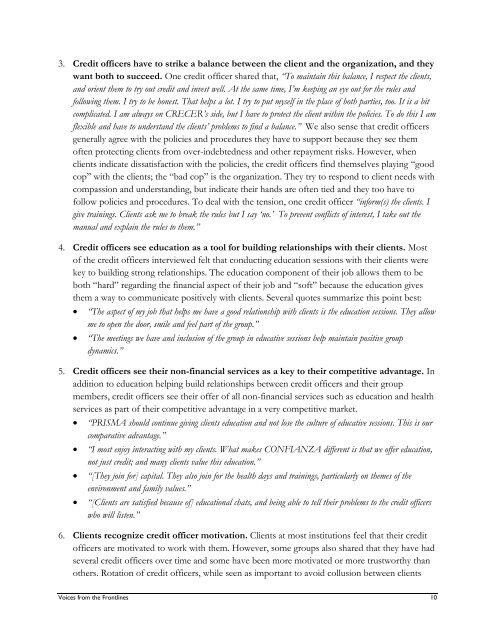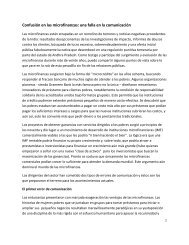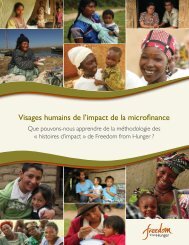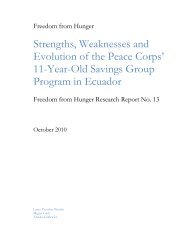Voices from the Frontlines: - Freedom from Hunger
Voices from the Frontlines: - Freedom from Hunger
Voices from the Frontlines: - Freedom from Hunger
Create successful ePaper yourself
Turn your PDF publications into a flip-book with our unique Google optimized e-Paper software.
3. Credit officers have to strike a balance between <strong>the</strong> client and <strong>the</strong> organization, and <strong>the</strong>y<br />
want both to succeed. One credit officer shared that, “To maintain this balance, I respect <strong>the</strong> clients,<br />
and orient <strong>the</strong>m to try out credit and invest well. At <strong>the</strong> same time, I’m keeping an eye out for <strong>the</strong> rules and<br />
following <strong>the</strong>m. I try to be honest. That helps a lot. I try to put myself in <strong>the</strong> place of both parties, too. It is a bit<br />
complicated. I am always on CRECER’s side, but I have to protect <strong>the</strong> client within <strong>the</strong> policies. To do this I am<br />
flexible and have to understand <strong>the</strong> clients’ problems to find a balance.” We also sense that credit officers<br />
generally agree with <strong>the</strong> policies and procedures <strong>the</strong>y have to support because <strong>the</strong>y see <strong>the</strong>m<br />
often protecting clients <strong>from</strong> over-indebtedness and o<strong>the</strong>r repayment risks. However, when<br />
clients indicate dissatisfaction with <strong>the</strong> policies, <strong>the</strong> credit officers find <strong>the</strong>mselves playing “good<br />
cop” with <strong>the</strong> clients; <strong>the</strong> “bad cop” is <strong>the</strong> organization. They try to respond to client needs with<br />
compassion and understanding, but indicate <strong>the</strong>ir hands are often tied and <strong>the</strong>y too have to<br />
follow policies and procedures. To deal with <strong>the</strong> tension, one credit officer “inform(s) <strong>the</strong> clients. I<br />
give trainings. Clients ask me to break <strong>the</strong> rules but I say ‘no.’ To prevent conflicts of interest, I take out <strong>the</strong><br />
manual and explain <strong>the</strong> rules to <strong>the</strong>m.”<br />
4. Credit officers see education as a tool for building relationships with <strong>the</strong>ir clients. Most<br />
of <strong>the</strong> credit officers interviewed felt that conducting education sessions with <strong>the</strong>ir clients were<br />
key to building strong relationships. The education component of <strong>the</strong>ir job allows <strong>the</strong>m to be<br />
both “hard” regarding <strong>the</strong> financial aspect of <strong>the</strong>ir job and “soft” because <strong>the</strong> education gives<br />
<strong>the</strong>m a way to communicate positively with clients. Several quotes summarize this point best:<br />
“The aspect of my job that helps me have a good relationship with clients is <strong>the</strong> education sessions. They allow<br />
me to open <strong>the</strong> door, smile and feel part of <strong>the</strong> group.”<br />
“The meetings we have and inclusion of <strong>the</strong> group in educative sessions help maintain positive group<br />
dynamics.”<br />
5. Credit officers see <strong>the</strong>ir non-financial services as a key to <strong>the</strong>ir competitive advantage. In<br />
addition to education helping build relationships between credit officers and <strong>the</strong>ir group<br />
members, credit officers see <strong>the</strong>ir offer of all non-financial services such as education and health<br />
services as part of <strong>the</strong>ir competitive advantage in a very competitive market.<br />
“PRISMA should continue giving clients education and not lose <strong>the</strong> culture of educative sessions. This is our<br />
comparative advantage.”<br />
“I most enjoy interacting with my clients. What makes CONFIANZA different is that we offer education,<br />
not just credit; and many clients value this education.”<br />
“[They join for] capital. They also join for <strong>the</strong> health days and trainings, particularly on <strong>the</strong>mes of <strong>the</strong><br />
environment and family values.”<br />
“[Clients are satisfied because of] educational chats, and being able to tell <strong>the</strong>ir problems to <strong>the</strong> credit officers<br />
who will listen.”<br />
6. Clients recognize credit officer motivation. Clients at most institutions feel that <strong>the</strong>ir credit<br />
officers are motivated to work with <strong>the</strong>m. However, some groups also shared that <strong>the</strong>y have had<br />
several credit officers over time and some have been more motivated or more trustworthy than<br />
o<strong>the</strong>rs. Rotation of credit officers, while seen as important to avoid collusion between clients<br />
<strong>Voices</strong> <strong>from</strong> <strong>the</strong> <strong>Frontlines</strong> 10















